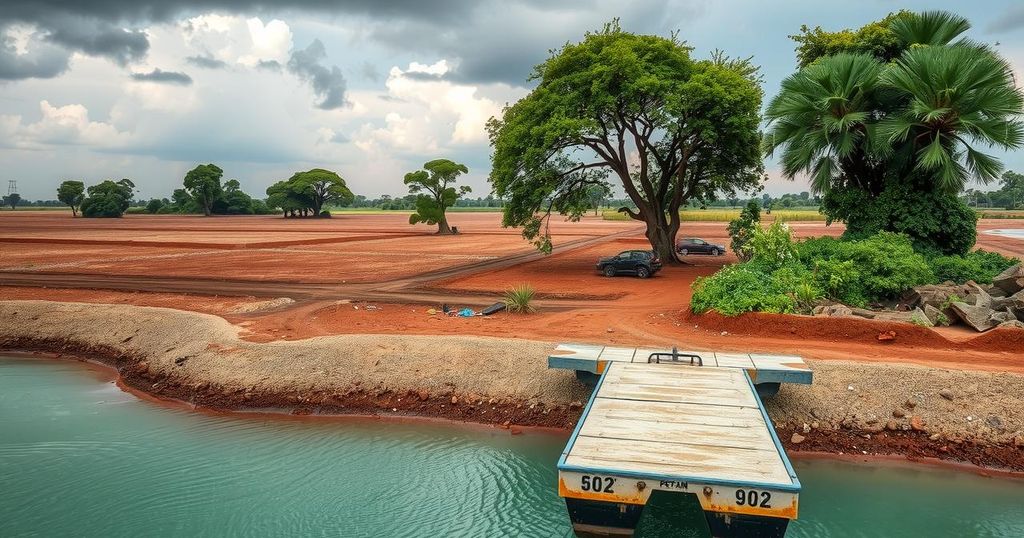Mozambique and Malawi Face Rising Climate Challenges as Cyclone Chido Strikes

Cyclone Chido has significantly impacted northern Mozambique, displacing thousands and causing widespread destruction. This event is part of a worrying trend of increasing cyclones in southern Africa due to climate change. The immediate humanitarian response is ongoing, but there are concerns regarding long-term implications for health, education, and food security. Enhanced preparedness and international support are crucial for the affected regions as they face future climate challenges.
Cyclone Chido has caused extensive damage in northern Mozambique, having swept through southern Africa after impacting the French Indian Ocean island of Mayotte on December 15. Particularly affected are the Cabo Delgado and Nampula provinces, resulting in the displacement of thousands of residents. In recent years, the region has faced a surge in storm frequency, with notable cyclones such as Freddy in 2023 and Idai in 2019 significantly impacting the local population.
The increase in cyclone events is attributed to climate change, which has altered weather patterns, leading to more extreme conditions in southern Africa. Lucy Mtilatila, Malawi’s Director of Climate Change and Meteorological Services, noted that global warming has intensified these phenomena, with cyclones now occurring much more frequently than in the past. Cyclone Chido unleashed winds of up to 260 km/h (160 mph) and over 250 mm (10 inches) of rain within 24 hours, severely affecting already vulnerable regions in Mozambique.
The National Institute of Meteorology (INAM) reported considerable rains exacerbating an already precarious situation. Guy Taylor of UNICEF expressed concern regarding the immediate loss of life and damage to vital infrastructure, such as schools and healthcare facilities, while also highlighting long-term implications like potential disruptions to education and increased risks of waterborne diseases.
Emergency shelters are being established to assist the approximately 2,800 displaced individuals in Pemba, but the full extent of the cyclone’s impact remains uncertain due to ongoing assessments and challenges in communication with severely affected areas. Luisa Meque, head of Mozambique’s National Institute for Risk and Disaster Management, stated that the damage from Cyclone Chido rivals that of Cyclone Freddy from the previous year as recovery efforts from past cyclones continue.
In Malawi, preventive measures appear to have improved, with enhanced coordination among governmental institutions in preparing for such disasters. Mtilatila emphasized the importance of comprehensive preparedness, including proactive planning for infrastructure and community relocations to mitigate future risks. Amidst ongoing food insecurity due to previous drought conditions, the Malawian government anticipates challenges in sustaining affected populations, particularly as the nation grapples with the repercussions of climate change.
Organizations such as UNICEF and the UN World Food Program are actively involved in the responses in Mozambique and Malawi, urgently calling for increased international support to address the root causes of climate change and bolster local resilience against future disasters. Mtilatila concluded by asserting that the experience gained from these cyclones must inform future rebuilding efforts to enhance community durability against environmental threats.
Southern Africa is currently confronting a series of escalating climate challenges, particularly in Mozambique and Malawi. These challenges are exemplified by Cyclone Chido, which struck on December 15, 2024, displacing thousands and raising concerns about the broader implications of climate change on weather patterns in the region. Historically, cyclones like Freddy, Gombe, and Idai have already wreaked havoc in this part of the world, indicating a worrying trend of increasing cyclone frequency and severity. Experts attribute these changes largely to global warming and the consequent rise in ocean temperatures, enhancing conditions favorable for cyclone development. The vulnerability of infrastructure and communities exacerbated by past disasters raises significant concerns for future storm preparedness and response strategies.
In summary, Cyclone Chido has highlighted the urgent need for enhanced disaster preparedness and resilience in Mozambique and Malawi as climate change precipitates more severe weather events. While immediate humanitarian efforts are underway to address the cyclone’s impact, the long-term implications for health, education, and food security must also be carefully considered. The responses to Cyclone Chido and future climate events highlight the critical importance of international support, proactive planning, and the need for a concerted effort to combat the root causes of climate vulnerability in southern Africa.
Original Source: www.dw.com








